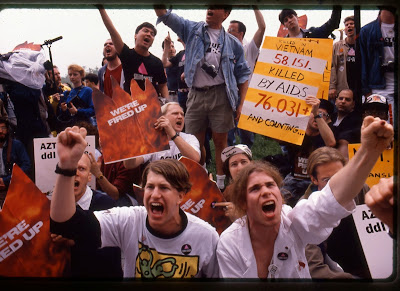“In absence of adequate healthcare, we
have learned to be our own clinicians, researchers, lobbyists, drug smugglers,
pharmacists… We have our own libraries, newspapers, drug stores and
laboratories…”
The ongoing argument about the
Affordable Care Act (Obamacare) in America seems to mainly focus on one crucial
premise: Should the wider population be
forced to accommodate the healthcare costs of a minority? Proponents of the law claim that by spreading
the cost of coverage around then the overall economic benefits from having a
healthy population will outweigh the costs.
Critics of the law claim that it is overreaching (to the point of
tyrannical) and that individuals should look after themselves. This split is mainly drawn down political
lines, with Republicans on one side (against) and Democrats on the other
(for). The question of coverage is not
necessarily focused on specific aliments and conditions.
Imagine how divisive the argument gets
then when (so called) morality is included in the equation. In the AIDS epidemic of the late ‘80s and
early ‘90s, one group of people (the mostly gay minority) insisted that more
action was taken to prevent a specific disease from spreading; and the other
group of people, mostly religious conservatives, wanted to prevent the disease
by eradicating ‘sinful’ behaviour. The
argument is essentially the same though; the right-wingers want to combat a
disease by enforcing responsibility on the individual, whereas the left-wingers
want to encourage collective action to help a disadvantaged minority.
David France’s documentary tells the
powerful story of how a group of HIV positive and People With AIDS (PWA’s)
managed to vocalise the issue during local and presidential election campaigns,
as well as pressure pharmaceutical companies to change the testing period for
new drugs. The film starts in Greenwich
Village, the epicenter of the epidemic in 1987, and move through to 1996 with
the successful complimentary trials of drugs that have managed to suppress the disease. Along the way it intercuts home movies and
underground activism with protest movement footage and talking heads of a group
of activists telling their story.
The filmmaking features familiar
aesthetics of queer cinema, such as men in leather jackets giving monologues
with cigarettes, and street activism with 8mm and lens flare (I guess they need
to be seen to be recognized) – the film also highlights something that I’ve
thought about the gay movement for years:
they are aggressively democratic and they have the best slogans… It also a documentary in the truest sense as
it is comprised primarily of amateur footage documenting the era, and it serves itself as an important
historical document highlighting the inaction of Reagan and Bush Snr. on this
issue.
Unfortunately, the film is also an
allegory of one of the problem with left wing movements. The beginning half an hour has lots of
footage of underground meetings culminating in non-violent protests and slogan
politics. The protests are thoughtful
and are curated by straw polls and discussion in order to achieve aims and
objectives, yet as the film progresses chronologically the meetings get more angry
and disorganized. Much effort is made to
not lionize a leader of group of elites, exactly like during the Occupy
movement, that in the end there is a lack of structure that stifles progress.
Much of the film incites anger at the
lack of action from the government at the time (Reagan himself never used the
word ‘AIDS’ in his entire two terms), and the story highlights an important
turning point in gay rights. However, it
is unfortunate that the film is released during the middle of the Obamacare
application rhetoric as a film that shows the importance of healthcare for a
minority and the power of individuals asking for governmental overreach instead
of corporations is only going to appeal to one side of the debate. Another documentary that regrettably will perhaps
only preach to the converted…
How To Survive A Plague is available on DVD from Amazon from 31st March 2014



No comments:
Post a Comment